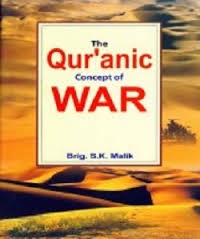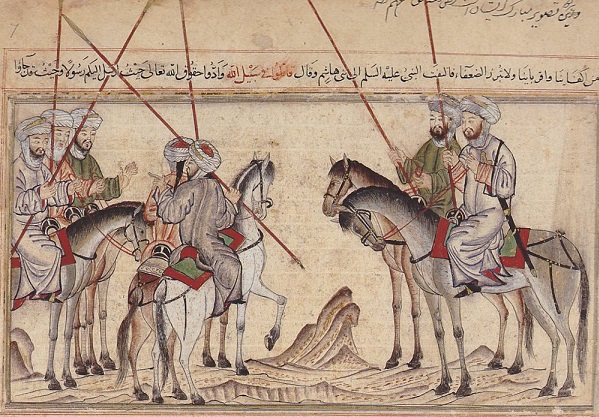 The Qur’anic Concept of War (1979) is one of “4 core texts of jihadists” today. US military officials are finding summaries of it in various languages on captured and killed jihadists. Written by Pakistani Brigadier General S. K. Malik with the first English Indian reprint edition published by Himalayan Books in 1986. This is more than just a study of the military campaigns of the Muslim Prophet Muhammad between 610-630 A.D. against the various tribes inhabiting Saudi Arabia, and those who refused to pay protection-taxes to Muhammad. This book religiously reviews and quotes from the Muslim’s Holy Book: the Qur’an/Koran, detailing how Allah outlined the principles of Islamic warfare.
The Qur’anic Concept of War (1979) is one of “4 core texts of jihadists” today. US military officials are finding summaries of it in various languages on captured and killed jihadists. Written by Pakistani Brigadier General S. K. Malik with the first English Indian reprint edition published by Himalayan Books in 1986. This is more than just a study of the military campaigns of the Muslim Prophet Muhammad between 610-630 A.D. against the various tribes inhabiting Saudi Arabia, and those who refused to pay protection-taxes to Muhammad. This book religiously reviews and quotes from the Muslim’s Holy Book: the Qur’an/Koran, detailing how Allah outlined the principles of Islamic warfare.The Qur’an — the Book of Allah, according to Islamic teaching, the Qur’an came down as a series of scriptures from Allah through the Archangel Gabriel to the Prophet Muhammad, who then dictated it to his followers. The early revelations were peaceful, but the Qur’an’s commandments to Muslims to wage war in the name of Allah against non-Muslims are unmistakable. They are, furthermore, absolutely authoritative as they were revealed late in the Prophet’s career and so cancel out and replace earlier instructions to act peaceably when weak. In 630, Muhammad and his forces marched to Mecca and defeated its defenders The Prophet rededicated the Ka’ba temple to Allah, and witnessed the conversion to Islam of nearly the entire Meccan population. Muhammad died in 632, having conquered nearly all of Arabia for Islam. Within 100 years of Muhammad’s death, Islam had reached the Atlantic in one direction and the borders of China in the other.
This success was due in large part to the military and political abilities of Muhammad’s successors, the caliphs. See more at: http://www.religionfacts.com/islam/history/prophet.htm#sthash.Rf58pzSw.dpuf
Westerners who manage to pick up a translation of the Qur’an are often left bewildered as to its meaning thanks to ignorance of a critically important principle of Qur’anic interpretation known as “abrogation.” The principle of abrogation that directs that verses revealed later in Muhammad’s career to “abrogate” — i.e., cancel and replace — earlier ones whose instructions they may contradict. Thus, passages revealed later in Muhammad’s career when his Army was successful in Medina, overrule peaceful passages revealed earlier, in Mecca.
Consider Qur’an 9:5, commonly referred to as the “Verse of the Sword”, revealed toward the end of Muhammad’s life: 9:5. When the Sacred Months (the 1st, 7th, 11th, and 12th months of the Islamic calendar) have passed, then kill the Mushrikun {unbelievers} wherever you find them, and capture them and besiege them, and prepare for them each and every ambush. But if they repent and perform As-Salat {the Islamic ritual prayers}, and give Zakat {alms}, then leave their way free. Verily, Allah is Oft-Forgiving, Most Merciful.
Having been revealed later in Muhammad’s life than 50:45, 109, and 2:256, the Verse of the Sword abrogates their peaceful injunctions in accordance with 2:106. Sura 8, revealed shortly before Sura 9, reveals a similar theme:
8:39. And fight them until there is no more Fitnah (disbelief and. worshipping others besides Allah) and the religion (worship) will all be for Allah Alone. But if they cease (worshipping others besides Allah), then certainly, Allah is All-Seer of what they do.
8:67. It is not for a Prophet that he should have prisoners of war (and free them with ransom) until he had made a great slaughter (among his enemies) in the land. You desire the good of this world (i.e. the money of ransom for freeing the captives), but Allah desires (for you) the Hereafter. And Allah is All-Mighty, All-Wise.
9:29. Fight against those who believe not in Allah, nor in the Last Day, nor forbid that which has been forbidden by Allah and His Messenger and those who acknowledge not the religion of truth (i.e. Islam) among the people of the Scripture (Jews and Christians), until they pay the Jizya with willing submission, and feel themselves subdued. The Qur’an itself lays out the principle of abrogation: Without knowledge of the principle of abrogation, Westerners will continue to misread the Qur’an and misdiagnose Islam as a “religion of peace.” For the Silo George Filer. Filer’s Files #05-2015
Supplemental- http://counterjihadreport.com/tag/steve-coughlin/


